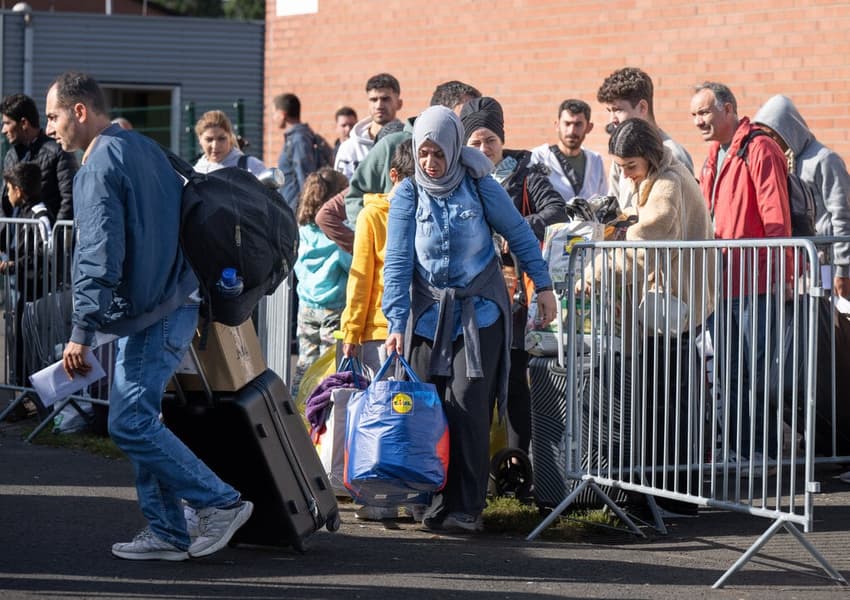German states demand more funding to help manage refugees

German state leaders are urging the government to allocate more money to local authorities to help deal with the intake of refugees.
Ahead of a summit meeting on immigration policy scheduled for Monday, Germany's federal states are pressing for more money from the central government for the care of asylum seekers and refugees.
The chairman of the Conference of Minister Presidents (MPK), Hesse's head of government Boris Rhein, of the Christian Democrats (CDU), told DPA in Wiesbaden: "This year alone, the costs for asylum and refugee-related expenditure by the federal states totalled €17.6 billion. Added to this is a further €5.7 billion in costs borne by the municipalities."
According to Rhein, the federal government is contributing to these costs this year with "only €3.75 billion and (central politicians) want to reduce the amount for 2024 to €1.25 billion".
Rhein added: "From the point of view of the federal states, this is unacceptable because the federal government is leaving the cities and municipalities alone with their problems."
READ ALSO: How Germany wants to ease employment rules for 'tolerated' migrants
A federal-state summit on Monday will focus on migration as well as financing issues. The meeting will also look at whether cash payments for asylum seekers should be replaced by a payment card and benefits in kind.
The issue of asylum policies and irregular migration is getting ever more heated in Germany.
Chancellor Olaf Scholz has taken a tougher stance lately saying that Germany needs to start deporting migrants who don't have the right to stay in the country "on a large scale".
It comes as voters have shown increasing support for anti-immigration parties like the Alternative for Germany (AfD), according to polls. The German public have also said in surveys that migration is a top concern for them.
READ ALSO: Which big issues are German voters most concerned about?
On Friday, Scholz was planning to discuss immigration policy with conservative leader Friedrich Merz and CSU regional group leader Alexander Dobrindt. The meeting has not been officially announced, with both sides agreeing to maintain confidentiality.
Scholz is involving the opposition in efforts to limit irregular migration because he is aiming for the broadest possible consensus on this issue, according to commentators.
Comments
See Also
Ahead of a summit meeting on immigration policy scheduled for Monday, Germany's federal states are pressing for more money from the central government for the care of asylum seekers and refugees.
The chairman of the Conference of Minister Presidents (MPK), Hesse's head of government Boris Rhein, of the Christian Democrats (CDU), told DPA in Wiesbaden: "This year alone, the costs for asylum and refugee-related expenditure by the federal states totalled €17.6 billion. Added to this is a further €5.7 billion in costs borne by the municipalities."
According to Rhein, the federal government is contributing to these costs this year with "only €3.75 billion and (central politicians) want to reduce the amount for 2024 to €1.25 billion".
Rhein added: "From the point of view of the federal states, this is unacceptable because the federal government is leaving the cities and municipalities alone with their problems."
READ ALSO: How Germany wants to ease employment rules for 'tolerated' migrants
A federal-state summit on Monday will focus on migration as well as financing issues. The meeting will also look at whether cash payments for asylum seekers should be replaced by a payment card and benefits in kind.
The issue of asylum policies and irregular migration is getting ever more heated in Germany.
Chancellor Olaf Scholz has taken a tougher stance lately saying that Germany needs to start deporting migrants who don't have the right to stay in the country "on a large scale".
It comes as voters have shown increasing support for anti-immigration parties like the Alternative for Germany (AfD), according to polls. The German public have also said in surveys that migration is a top concern for them.
READ ALSO: Which big issues are German voters most concerned about?
On Friday, Scholz was planning to discuss immigration policy with conservative leader Friedrich Merz and CSU regional group leader Alexander Dobrindt. The meeting has not been officially announced, with both sides agreeing to maintain confidentiality.
Scholz is involving the opposition in efforts to limit irregular migration because he is aiming for the broadest possible consensus on this issue, according to commentators.
Join the conversation in our comments section below. Share your own views and experience and if you have a question or suggestion for our journalists then email us at [email protected].
Please keep comments civil, constructive and on topic – and make sure to read our terms of use before getting involved.
Please log in here to leave a comment.